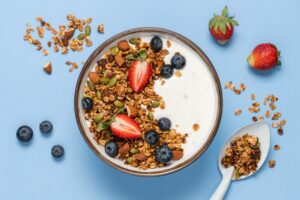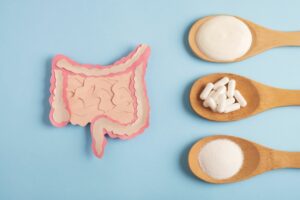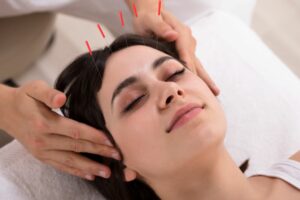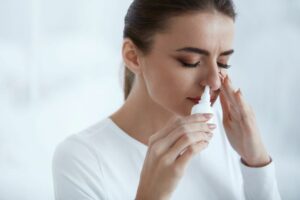Spring aka hay fever season has arrived which means plenty of red eyes and runny noses. Hannah Braye, Bio-Kult’s Technical advisor reveals 5 ways to help reduce symptoms
Whilst many of the population feel happy about the arrival of Spring, for those who suffer with hay fever it can be a very different story.
Hay fever (also known as seasonal allergic rhinitis), is a skewed immune reaction to inhaled pollen released from local trees, grasses and flowers.
It’s symptoms such as sneezing, coughing, itchy, red watery eyes, blocked or runny nose, loss of smell, itching, headache and tiredness can be uncomfortable and significantly impact on quality of life.
Here are 5 tips to help stop hay fever from ruining your day…
#1 Reduce your exposure to pollen
Tracking the pollen count in your area and where possible, avoiding spending lots of time outdoors when it’s at its highest is likely to reduce exposure and irritation.
Keeping windows and doors shut on high pollen days can also help – instead using fans or air con to keep cool is also advisable.
When you have been outside, showering when you get home and especially before bed will help remove pollen residue from the skin, hair and nasal passages. This may also help reduce irritation overnight, helping you to get a better night’s sleep.
showering when you get home and especially before bed will help remove pollen residue from the skin
In addition, try irrigating the nasal passages once a day using a neti-pot and saline solution, to remove pollen residue and help clear any stuffiness.
A 2017 Cochrane Review concluded that nasal saline irrigation may have benefits in both adults and children in relieving the symptoms of hay fever and is unlikely to be associated with adverse effects.
Similarly a recent 2019 meta-analysis found that nasal irrigation significantly improved nasal symptom scores and significantly lowered rescue antihistamine use in children with hay fever.
#2 Eat more fermented foods
Recent research points to an important role of the gut microbiome in allergic conditions.
It is well established that the microbiome can modulate immune responses and bacterial dysbiosis (an imbalance of the gut microbes) is a risk factor for inflammatory conditions, such as hay fever.
It is thought that fermented foods containing lactic-acid producing bacteria are able to deviate the immune response away from a pro-allergy response.
consumption of live yogurt can reduce some of the clinical symptoms of allergy
Therefore, regularly incorporating traditionally fermented foods such as sauerkraut, kimchi, kefir, live yoghurt, miso and kombucha, which contain live bacteria in the diet may be beneficial.
For example, dietary studies have suggested that long-term consumption of live yogurt can reduce some of the clinical symptoms of allergy in adults with hay fever or nasal allergies.

#3 Take a probiotic supplement
In addition, research also suggests that live bacteria supplements, such as Bio-Kult Advanced Multi-Strain Formulation, containing 14 different strains, may benefit hay fever sufferers (similar to fermented foods, via interactions with the immune system, which modify the natural course of allergic disease.
A study published in 2019 showed that a multi-strain live bacteria supplementation taken for eight weeks by individuals with hay fever reduced overall symptom severity, the frequency of medication use and improved quality of life.
may be even more effective when taken for a period prior to hay fever season as a preventative measure
These findings are similar to a 2017 study that found that supplementing with a multi-strain live bacteria formula containing lactobacilli and bifidobacterium species for eight weeks helped to alleviate hay fever symptoms and improved quality of life during allergy season in hay fever sufferers, potentially due to enhanced activity of cells that help to regulate the immune system.
Although beneficial effects of live bacteria supplementation have been shown even when commenced at the height of allergy symptoms, it is hypothesised that they may be even more effective when taken for a period prior to hay fever season as a preventative measure.

#4 Try acupuncture
Increasing evidence is supporting the ability of acupuncture to help modulate the immune system, with potential benefits in allergic conditions.
A 2015 meta-analysis suggests that acupuncture could be a safe and valid way to manage hay fever symptoms.
Analysing the results of 13 studies, it was found that compared with control groups, acupuncture treatment group showed a significant reduction in nasal symptoms, medication scores and IgE antibody levels as well as a significant improvement in quality of life.

#5 Eat more quercetin and vitamin C rich foods
The phytonutrient quercetin is known for its anti-allergic properties, and is therefore a useful addition to any anti-allergy diet.
Quercetin is thought to possess antioxidant, anti-inflammatory and anti-histamine properties.
The main food sources are vegetables such as onions, garlic and broccoli, fruits such as apples, berries and grapes, some herbs and green and black tea.
phytonutrient quercetin is known for its anti-allergic properties
Quercetin appears to work synergistically with vitamin C, so topping up on lots of vitamin C rich foods such as broccoli, kiwi, strawberries, peppers and parsley is a good idea.
Vitamin C is also an anti-oxidant which protects cells against free-radicals in allergic inflammatory responses and studies have found that children with increased vitamin C consumption had fewer hay-fever symptoms.
More Healthista Content:
4 guaranteed ways these luxury wellness retreats say you can de-stress
4 signs your low mood shouldn’t be ignored plus what may help
Food synergy – 9 healthy recipes with food combinations guaranteed to super-boost your health
Has Covid put you off having kids? This could be why
Look after yourself: 6 self-care essentials for a happier, healthier you









